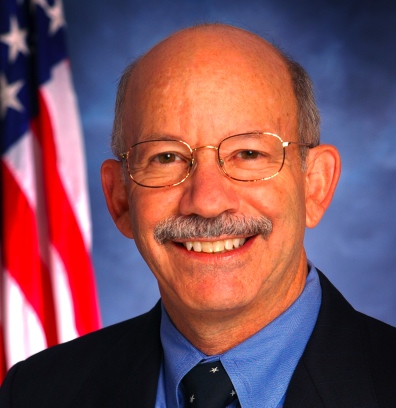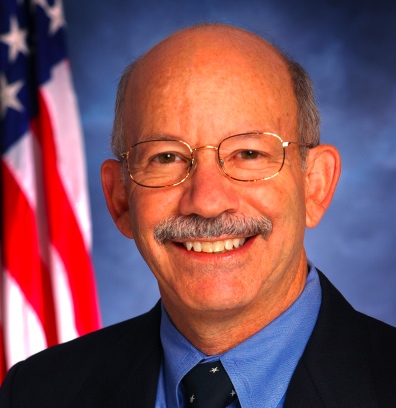Rep. Peter DeFazio (D-Ore.) made one thing clear on Friday: he’s just not that into the cap-and-trade legislation under debate in the House.
 Peter DeFazio was first elected to the House in 1986. He represents Oregon’s 4th district in the southwestern part of the state.Courtesy Rep. DeFazioIn a speech in Portland, DeFazio decried the focus on creating a market-based system for trading pollution-credits and permitting a substantial use of carbon offsets.
Peter DeFazio was first elected to the House in 1986. He represents Oregon’s 4th district in the southwestern part of the state.Courtesy Rep. DeFazioIn a speech in Portland, DeFazio decried the focus on creating a market-based system for trading pollution-credits and permitting a substantial use of carbon offsets.
“There’s an unholy alliance of big business, some environmental groups and Wall Street” backing cap-and-trade, said DeFazio, comparing the scheme to the deregulation of the electricity markets that ultimately led to soaring rates in some states. “Wall Street is excited about another thinly regulated market.”
A system that caps emissions and allows companies to trade pollution permits would enable financial gamesmanship but do little for the environment, according to DeFazio, who penned an op-ed making similar allegations back in January. Instead, he just wants there to be a cap on carbon, and polluters should be forced to stay under that limit. If they exceed the limit, they should be fined aggressively, he said.
It remains an open question whether DeFazio plans to vote against the American Clean Energy and Security Act, which is expected to come up for floor debate in the House very soon. Much has been made about opposition to the bill from Republicans and agriculture-state Democrats, but DeFazio is one of the most vocal opponents among more liberal Democrats. He’ll be an interesting player to watch, and we hope to have more on his views soon.
In the meantime, here’s a message posted on his website back in April highlighting his thoughts on the subject:
Dear Oregonian,
The potential impacts of climate change in Oregon, the U.S., and the world are of the utmost importance and we must take immediate and meaningful action to reduce greenhouse gas (GHG) emissions. I’ve added this “Climate Policy” resource to my webpage to help inform Oregonians about climate policy happening in Washington, D.C. and Salem. I will regularly update this page with links to relevant news articles, reports, congressional testimony and other resources that I hope you find useful in participating in this important debate.
Once you’ve embraced the science of global warming and its potential impacts, one can begin to discuss the actions needed to reduce GHG emissions. Three approaches are receiving the most attention to deal with climate change in the U.S. The most popular approach is a cap-and-trade system that creates a market to buy and trade pollution allowances. A second approach is a carbon tax that would levy a tax on GHGs at their sources. A third option is to reduce emissions through a regulatory approach, such as a cap and permit system.
In my opinion, a cap-and-trade system is prone to market manipulation and speculation without any guarantee of meaningful GHG emission reductions. A cap-and-trade has been operating in Europe for three years and is largely a failure. Nearly $60 billion worth of carbon allowances are traded every year, yet emissions on the continent continue to rise. Deregulation of our electricity markets and the recent performance of financial markets around the world give me further cause for concern about using “the market” to solve a serious issue like climate change.
In comparison to a cap-and-trade, a carbon tax is a much more straight-forward approach. Many economists note a carbon tax is more efficient than a cap-and-trade since there is no market for speculators to manipulate. Further, revenues generated from a carbon tax could be channeled to consumers to help offset the costs of higher energy and commodity prices. Revenues could also be used to invest in energy efficiency, clean technologies, and adaptation projects.
Finally, a more old-fashion approach (but one that has served us well historically) would be through a regulatory scheme. In the 1970s we used the Clean Water Act to clean up our polluted rivers, lakes, and waterways with phenomenal success. The system works by establishing an emission reduction schedule and imposing stiff fines for those who do not meet their targets. This is the approach I prefer because it is a proven method for reducing pollution in the U.S.
A regulatory approach such as the Clean Water Act can be calibrated to meet the challenges of climate change. To this effect, I am a cosponsor of federal legislation called the Clean Environment and Stable Energy Market Act (H.R. 1683) introduced by Jim McDermott of Washington. This proposal would reduce GHG emissions by 80 percent by 2050 by requiring producers of GHG emissions to purchase pollution permits from the government. The price of these permits and a clear, predictable permit price schedule would be under the jurisdiction of the Treasury Secretary. Emissions would drop as the number of permits available is ratcheted down over time.
Importantly, this proposal would not allow for pollution permits to be traded or re-sold. The revenues raised by the government from selling the permits would be used to invest in energy efficiency, clean technology, and to assist low-income consumers. H.R. 1683 would avoid creating and regulating a new, complex energy market and relying on traders to set the cost for emitting climate-changing toxins into our atmosphere. This legislation also provides price certainty to consumers and industry, encourages investments in cleaner, more efficient technologies, and provides a more certain path to GHG emission reductions.
v Climate change is real. Our actions must be swift but comprehensive, and efficient but effective. A system that relies on an unregulated, market-based approach is too risky and unproven. That’s why I believe we must begin to discuss viable alternatives to a cap-and-trade. Again, I hope you find these resources useful in your consideration of how Oregon and the U.S. should proceed with policies to combat climate change.Sincerely,
Peter DeFazio
Member of Congress



